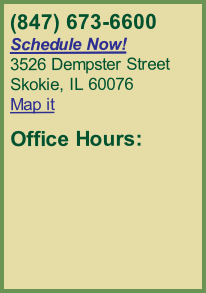


9am -
3pm -
M/W/Th:
3pm -
9am -
8am -
1st & 3rd Saturdays only
Tues:
Fri:
Sat:





If you would like more information on this topic or
would like an appointment, please call us at
(847) 673-
Office Hours:
M/W/Th:
9am-
Tues:
3pm-
Fri:
9am-
Sat:
8am-
Generally, “cracking joints” or “popping knuckles” are not harmful habits — as long as you don’t overdo it or as long as it does not produce pain or discomfort.
The term crepitus refers to the sound of bones grating. Crepitus may occur at any age, but it becomes more common as you get older. Degenerative changes with aging may cause the discs to shrink and lose elasticity. Maybe you can hear your neck cracking or popping when you look over your shoulder. This a symptom of neck crepitus.
Timothy O’Connor, M.D., director of Minimally Invasive and Robotic Spine Surgery at Marcus Neuroscience Institute, part of Baptist Health.
“You can experience neck crepitus at any age, but it’s more likely to occur more often as you get older,” explains Timothy O’Connor, M.D., director of Minimally Invasive and Robotic Spine Surgery at Marcus Neuroscience Institute, part of Baptist Health. “Neck crepitus can be an isolated finding, or it can be associated with other more serious symptoms such as pain, instability, weakness, numbness, diminished manual dexterity, and difficulty walking.”
What Exactly is Neck Crepitus?
Neck crepitus has to do with the cervical spine structure — or plainly stated — the bones, ligaments, tendons and nerves that make up your neck, said Dr. O’Connor. “Neck crepitus is the sensation of noise underlying movement, and cracking is also a similar phenomenon experienced with movement of a joint. Both are associated with release of nitrogen bubbles underlying a joint,” he adds.
Dr. O’Connor explains that the cervical spine contains seven segments, each with multiple joints that interact with each other. The cervical spine is flexible enough protect neurologic structures while maintaining stability of the head.
“The cervical spine is an incredibly flexible system that’s able to protect eloquent neurologic structures while maintaining stability of the head and neck,” said Dr. O’Connor. “It enables complex movements all while protecting the structures underneath. With the inherent flexibility of the neck, there are multiple joints at each level that can wear down over time. This can lead to arthritis and resulting neck crepitus.”
Many factors that can diminish functionality of the cervical spine, including age, injury, poor posture or diseases. Arthritis, for example, can lead to degeneration of the bones or joints of the cervical spine, causing disc herniation or bone spurs to form.
Other Symptoms That May Appear with Neck Crepitus
Dr. O’Connor emphasizes that neck crepitus or “cracking” is usually not something to worry about. However, the condition can also be associated with other more serious symptoms, such as:
Neck pain
Instability
Weakness
Numbness
Diminished manual dexterity
Difficulty walking
“It’s important to seek medical attention if you have symptoms such as neck pain, weakness, or sensory changes,” said Dr. O’Connor. “If you have pain radiating down the arm, or you have difficulty completing fine motor tasks, such as buttoning a shirt or writing, you should consult your doctor. These symptoms can potentially be caused by spinal cord or nerve root compression or other serious issues.”
Similarly, if crepitus occurs nearly every time you move a certain joint, a functionality issue that is likely to worsen could have developed — and that also requires a medical consultation, he adds.
What are Some Possible Causes of Neck Crepitus?
Neck crepitus can be caused by several separate factors, or multiple factors combined. Articular pressure Variations represent one factor. The condition involves small gas bubbles that form within your joints. When the bubbles collapse, they are released, which creates cracking noises in the joints. These cracking sounds can occur during your neck’s natural movements.
Sometimes, a moving tendon (tissue that connects muscles to bones) or ligament (tissue that connects bones to each other) can make a cracking or popping noise. The sound can result from excessively tight tissues and muscles that can happen as you age.
Additionally, osteoarthritis (called spondylosis in the spine) can cause the facet joints that connect your vertebrae to degenerate. Protective cartilage then is worn down, and the adjacent vertebral bones begin to rub against each other. This often produces a grinding noise. Disc degeneration can also cause a grinding sound from the reduction in the cushioning between two vertebrae.
Treating or Preventing Neck Crepitus
There are several treatments for neck crepitus. Dr. O’Connor recommends beginning with conservative treatments, such as physical therapy and pain management. This approach can be effective when there is no evidence of damage to the spinal cord or nerve roots.
“If imaging tests show signs of compression of the spinal cord or nerves on imaging, treatment would include removing the pressure off the neural structures and stabilization of the spine,” said Dr. O’Connor. “Before any surgical treatment is considered, conservative treatment such as physical therapy and pain management is recommended as long as there is no evidence of damage to the spinal cord or neurologic structures around the spine. Cervical traction can also be considered.”
What are the cracking sounds in my neck?
All content copyright © Healing Hands Wellness & Chiropractic Center Ltd.
www.HealingHandsOfSkokie.com phone:
(847) 673-